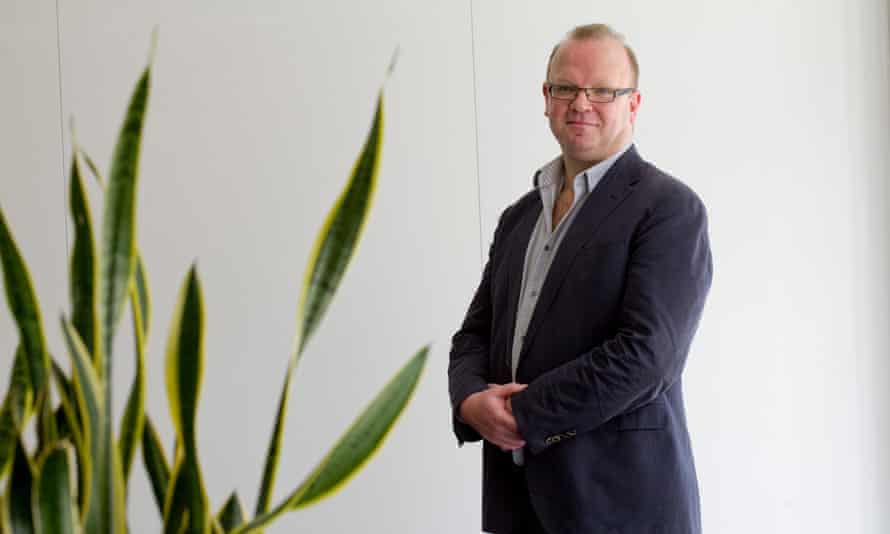The Lawyer, Barrister Who First Fought to Decriminalize Homosexuality Worldwide Dies at 58
 |
| Jonathan Cooper, head of Human Dignity Trust, fought laws that persecute people on the basis of their sexual orientation. Photograph: Martin Argles/The Guardian |
The barrister Jonathan Cooper, who has died suddenly aged 58, was the driving force behind numerous human rights campaigns over the past 30 years. Exuberant, knowledgable and admired by a wide circle of friends, he was at the forefront of efforts to decriminalise homosexuality around the world and a pivotal figure in educating a generation of civil servants about the Human Rights Act.
Cooper may not have been a prominent public figure or a highly paid QC, but as a barrister he was a tireless crusader, devising ingenious legal challenges and campaign strategies. Geoffrey Robertson QC, joint head of Doughty Street Chambers, where Cooper practised for most of his working life, described him as a brilliant scholar providing “ammunition” for advocates to win courtroom battles.
His boldest initiative was the Human Dignity Trust, a charity he establishedin 2011 with Tim Otty QC. The aim was to initiate or support strategic litigation overseas challenging laws that persecute individuals on the basis of their sexual orientation and gender identity. Many punitive and discriminatory statutes in Commonwealth countries are, as Cooper often pointed out, the legacy of British colonial rule.
Test cases were fought and LGBT activists helped in Belize, Uganda, Jamaica, Kenya, Cyprus and other countries. Among the obstacles Cooper had to overcome was the Charity Commission’s initial decision – eventually overturned – that the trust’s activities were not sufficiently of “public benefit”. The trust’s work continues: 71 countries still criminalise private, same-sex, consensual sexual activity, and in some the punishment is death.
Having stepped down as chief executive of the HDT in 2016, he had recently been working with Helena Kennedy QC on a legal framework for a bill banning “conversion therapies”, which attempt to change an individual’s sexual orientation. “He was really inventive,” she said, “a great collaborator.”
In earlier years, Cooper had been involved in a range of landmark cases and campaigns, including those fought against bans on gay people in the armed forces and the mistreatment of asylum seekers in Greece.
Known in chambers as Jonny, he had the knack of making people feel they were at the centre of his attention. Passionate about establishing LGBT equality, he also took up many other causes where he believed injustices needed to be confronted, including supporting pro-democracy activists in Belarus.
Jonathan was born in Salford. His father, Peter Cooper, was a psychology lecturer at Manchester University, and his mother, Jackie (nee French), a market researcher. Three years later, in 1965, the family moved to London, where his parents set up a company that pioneered the use of focus groups to develop commercial brands.
In 1973, the family moved to Devon, although his parents continued to work during the week in London. Jonathan attended Dartington Hall school, a progressive, independent school in nearby Totnes. He went on to Goldsmiths, University of London to study psychology, but left after contracting glandular fever. He then switched to Kent University, where he read history.
According to the art historian Kevin Childs, his partner since 1992, Cooper had “never been in the closet” and was aware early on of HIV/Aids. His first job was as Aids coordinator for the Haemophilia Society, which took him for a year to Canada.
Convinced that vulnerable people needed legal help, he decided to study law. In 1992, he was called to the bar and joined Doughty Street Chambers, where one of his colleagues was Keir Starmer, now Labour party leader.
Cooper was always interested more in public policy than courtroom advocacy. He became legal director of the civil rights group Liberty, then joined the legal reform organisation Justice as head of its human rights project shortly after Labour’s 1997 election victory.
It was a significant moment. He helped prepare the ground for the 1998 Human Rights Act and for many years educated civil servants on the implications of the legislation. He held regular seminars for Foreign Office diplomats and officials from other departments. He also edited the European Human Rights Law Review. In 2007, he was made OBE “for services to human rights”.
A contributor of opinion pieces to the Guardian and other publications, he defended Starmer when the Labour leader was criticised for buying his mother a field – which, it turned out, was for a family donkey sanctuary. Cooper recalled his visit, years earlier, to the refuge and the care the animals received.
In 2018 he organised an anti-Brexit campaign declaring his home town, Totnes, to be an independent city state, and distributing “passports” to fellow remainers in protest at being forced to leave the EU.
Cooper, a board member of the Granta Trust, had been in the Scottish Highlands with members of the Rausing family, the philanthropists who publish Granta Books. He was walking beside a loch with Kevin and friends when, shortly after saying that it was one of the most beautiful views he had ever seen, he collapsed and could not be revived.
He and Kevin entered into a civil partnership in 2008. Kevin survives him, along with his sisters, Diana and Helen, four nieces and a nephew.
Comments